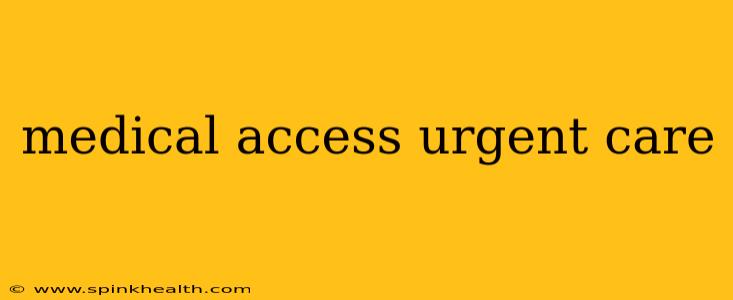Navigating Urgent Care: When to Go and What to Expect
The frantic rush to find medical attention when something unexpected happens—a nasty fall, a sudden fever, a persistent cough that won't quit—is a familiar feeling for many. This is where urgent care steps in, offering a crucial bridge between your family doctor and the emergency room. But knowing when urgent care is the right choice, and what you can expect when you get there, can be a game-changer in managing a health crisis. This isn't just about saving time; it's about accessing the right level of care efficiently and effectively. Let's unravel the mystery of urgent care.
Imagine this: It's a Saturday evening, and your child wakes up with a high fever and a painful earache. Your pediatrician's office is closed. Going to the emergency room feels like overkill, but you're understandably worried. This is precisely the scenario where urgent care shines.
What is Urgent Care?
Urgent care centers provide walk-in medical services for non-life-threatening illnesses and injuries. Think of it as a more immediate, less expensive alternative to the ER. They handle a wide range of conditions, from sprains and minor cuts to flu symptoms and infections. They're staffed by qualified medical professionals, including doctors, nurses, and physician assistants, who are equipped to diagnose and treat a variety of ailments.
What are the common conditions treated at urgent care facilities?
This is a broad question, and the answer depends on the specific center's capabilities. However, common issues treated at urgent care facilities usually include:
- Minor injuries: Cuts, sprains, strains, and minor burns.
- Illnesses: The flu, colds, strep throat, bronchitis, and urinary tract infections.
- Allergic reactions: (excluding severe, life-threatening ones).
- Skin conditions: Rashes, minor infections, and insect bites.
Important Note: Urgent care is not a substitute for emergency care. If you are experiencing a life-threatening emergency, such as chest pain, difficulty breathing, severe bleeding, or a sudden loss of consciousness, dial emergency services immediately.
How is urgent care different from the emergency room?
The key difference lies in the severity of the condition. Emergency rooms handle life-threatening situations requiring immediate, critical care. Urgent care centers focus on non-life-threatening conditions that need prompt attention but don't require the resources of an emergency department. This difference translates to shorter wait times and lower costs in most cases.
What should I expect during my urgent care visit?
Your experience will vary slightly depending on the specific facility, but generally, you can expect the following:
- Check-in: You'll likely need to fill out some paperwork providing your medical history and insurance information.
- Medical evaluation: A doctor or nurse practitioner will assess your condition, ask questions about your symptoms, and conduct a physical exam.
- Treatment: Depending on your diagnosis, you may receive treatment such as medication, wound care, or other therapies.
- Follow-up instructions: You'll receive instructions on how to care for yourself at home, along with information about follow-up appointments if needed.
How much does urgent care cost?
The cost of urgent care varies depending on several factors, including your insurance coverage, the services provided, and the location. It's generally cheaper than an emergency room visit, but it's always wise to check with the facility beforehand about their pricing structure and insurance policies.
How do I find an urgent care center near me?
Many online search engines and healthcare directories allow you to search for urgent care centers by location. You can also check with your insurance provider for a list of in-network urgent care facilities.
Choosing the right level of care is crucial, and understanding the role of urgent care can significantly improve your healthcare experience. Remember, while urgent care offers efficient and accessible treatment for a range of conditions, life-threatening emergencies always require immediate attention at the nearest emergency room. Being informed empowers you to make the best decisions for your health and well-being.

